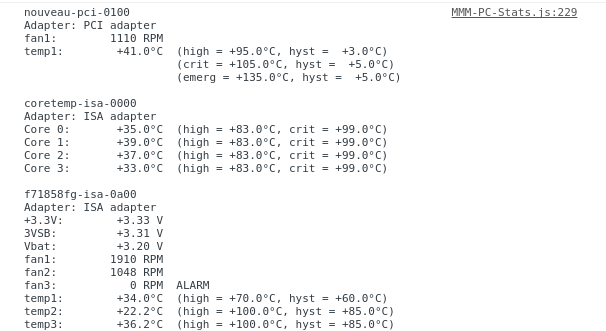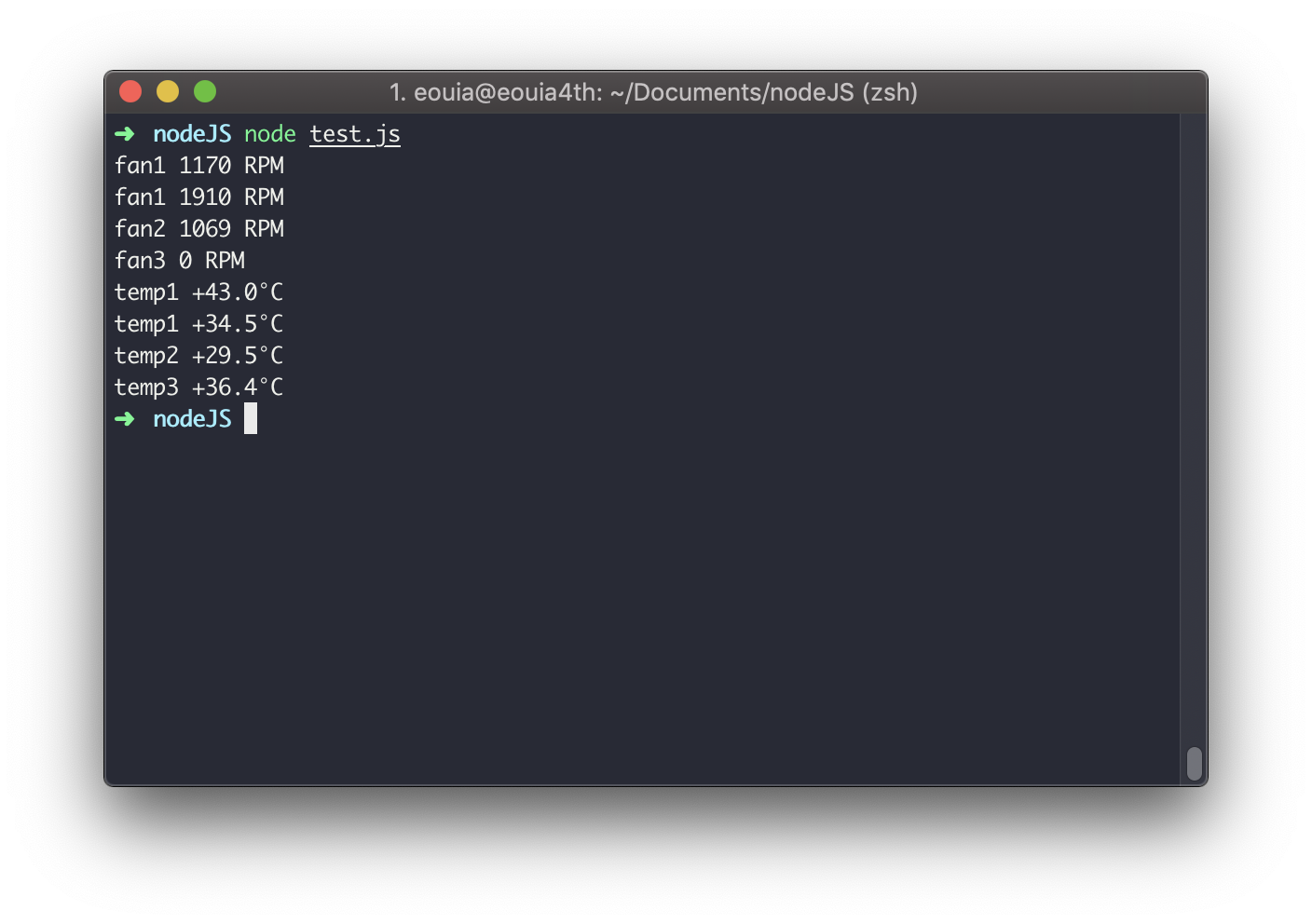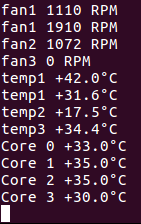Read the statement by Michael Teeuw here.
run Linux command from a mm2 module
-
Hello,
My following question is very basic and that’s because I have no JS experience whatsoever.
I’m trying to build a module that reads the content of a text file and display it on MM2.
So I want the module to run the “cat” linux command and display its output. This will be refreshed on some interval as the text file will change.
Is there’s a module that already does something similar?
I looked at helloword default module but the text variable is a static string. I tried to add $USER to see if it’ll get the Linux env var value in there but it didn’t.
I would be very thankful if anyone could provide me some pointers on how to go forward with this.
-
@autonomus the problem with the helloworld module is, that is only running in the browser environment, so it doesn’t have access to linux in that sense. What you need is a node_helper which has access to your machine.
A good example is the pir sensor module https://github.com/paviro/MMM-PIR-Sensor/blob/master/node_helper.js#L59 In this line it executes a linux command as a child process.
If you check the documentation you can get the response of it in a callback https://nodejs.org/dist/latest-v10.x/docs/api/child_process.html#child_process_child_process_exec_command_options_callback
If you need more information about node helpers you can check the docs here https://github.com/MichMich/MagicMirror/tree/master/modules#the-node-helper-node_helperjs
-
@strawberry-3-141 , thanks for the info. I’m starting to understand how this would work, but I can’t get it to run yet. Can you please take a quick look at my code to point me to what I’m doing wrong.
The missing piece is how to get the output from the Linux command and then pass it to the screen. How do I pass text to the Dom?
Also is my schedule update the right way to make the module rerun the command and refresh the screen?
//MMM-pichan.js
Module.register(‘MMM-pichan’,{requiresVersion: "2.1.0", start: function() { Log.log('Starting module: ' + this.name); },});
//node__helper.js
var NodeHelper = require(‘node_helper’);
const exec = require(‘child_process’).exec;module.exports = NodeHelper.create({
start: function () { this.scheduleUpdate(0); }, readfile: function () { //exec("cat /home/pi/Documents/PiChanServer/pichan_status.log", null); exec("cat /home/pi/Documents/PiChanServer/pichan_status.log", (error, stdout, stderr) => { if (error) { console.error(`exec error: ${error}`); return; } console.log(`stdout: ${stdout}`); }); }, scheduleUpdate: function(delay, fn) { var nextLoad = 3000; if (typeof delay !== 'undefined' && delay >= 0) { nextLoad = delay; } var self = this setTimeout(function() { self.readfile(); }, nextLoad); }});
-
the two parts of a module talk to each other thru socket notification events…
the node_helper can interact with the system ,but not the dom, and the module (js) interacts with the dom and not the system…
the two sides would use the sendSocketNotification(event_id, buffer) method…
each would have a method called socketNotificationReceived(event_id, buffer) that will be called when the event arrives…
the buffer can be any kind of data. formatted or not.
to open the socket the first time, the module.js MUST be the first side to sendSocketNotification().
typically the module sends the config info to the node_helper when its starts up.
this is another event notification, which is called notificationReceived(event, buffer, sender)
there are a a few builtin events, I use the ‘ALL_MODULES_STARTED’ event to send my module config to my helper and open the socket.
see the doc here for the additional specifics
https://github.com/MichMich/MagicMirror/tree/master/modulesthe event id strings for socketnotification are completely up to you… the MM system does not send socket notifications. it DOES send notifications (notice no ‘socket’) to the notificationReceived() method
but summary
-
create both files (per the doc)
-
when module receives the ‘ALL_MODULES_STARTED’ event, send a socket notification from the module to the helper to open the communications channel
-
when the node_helper gets new data, it sends a socket notification (will ONLY be to the module(js)) with the data
-
the module(js) uses the data to update the dom
-
if the module(js) decides when there should be new data, then the module sends a socket notification to the helper, and the helper responds with a socket notification with the new data (if any).
-
-
@strawberry-3-141 said in run Linux command from a mm2 module:
A good example is the pir sensor module https://github.com/paviro/MMM-PIR-Sensor/blob/master/node_helper.js#L59 In this line it executes a linux command as a child process.
I’m quoting your post of 5 months ago. This is exactly what I needed to do. I looked at the requirements and commands in the PIR-Sensor node_helper.js.#L59. With that, I added const exec = require(‘child_process’).exec; and built my function
getTerminal: function(url) { var self= this; exec("sensors").stdout.on('data', function(stdout) { var results = stdout; console.log(results); self.sendSocketNotification("TERMINAL_RESULT", results); }) },Success!
-
@mykle1 you didn’t need to do this
var results = stdout;Just use stdout as the variable name in the console log and sendsocketnotification
Every wasted instruction adds to the pgm size, and CPU cycles used, which could be applied somewhere else.
Also makes maintenance harder cause u might not remember why you did something.
-
Yes sir. Duly noted. And thanks for the instruction. I try to retain all the tidbits that are given but I find myself having to relearn much of what I thought I already knew. Can you say, “Alzheimers?” :-)
Thanks again.
-
I guess I celebrated a little prematurely. Yes, I can see the data in the terminal and send it to the module.js file. However, I am unable to convert it into usable data, such as an array of objects. I’ve tried all evening with no luck. The closest I’ve gotten is single object that contains all the data:
0: stdout:"nouveau-pci-0100↵Adapter: PCI adapter↵fan1: 1170 RPM↵temp1: +43.0°C (high = +95.0°C, hyst = +3.0°C)↵ (crit = +105.0°C, hyst = +5.0°C)↵ (emerg = +135.0°C, hyst = +5.0°C)↵↵coretemp-isa-0000↵Adapter: ISA adapter↵Core 0: +46.0°C (high = +83.0°C, crit = +99.0°C)↵Core 1: +41.0°C (high = +83.0°C, crit = +99.0°C)↵Core 2: +46.0°C (high = +83.0°C, crit = +99.0°C)↵Core 3: +38.0°C (high = +83.0°C, crit = +99.0°C)↵↵f71858fg-isa-0a00↵Adapter: ISA adapter↵+3.3V: +3.31 V ↵3VSB: +3.30 V ↵Vbat: +3.20 V ↵fan1: 1910 RPM↵fan2: 1069 RPM↵fan3: 0 RPM ALARM↵temp1: +34.5°C (high = +70.0°C, hyst = +60.0°C)↵temp2: +29.5°C (high = +100.0°C, hyst = +85.0°C)↵temp3: +36.4°C (high = +100.0°C, hyst = +85.0°C)↵↵"Using this:
getTerminal: function(url) { var self= this; // exec("sensors", (err, stdout, stderr) => console.log(stdout)); exec("sensors").stdout.on('data', function(stdout) { //console.log(JsonConvert.SerializeObject(stdout)); var s = stdout; var parts = s.split(':'); var jobj = {}; for(i=0;i < parts.length;i+=2) { jobj[parts[i]]=parts[i+1]; } console.log(JSON.stringify(jobj));I’m stuck. haha. I am grateful for any advice.
Peace!
-
@mykle1 let me see what I can do.
Will be tomorrow. -
@mykle1
You can use Regular Expression for getting matched text with pattern.var s = stdout var fan1 = new RegExp("fan1\:\s+([0-9]+ RPM)") var fan1_found = s.match(fan1) console.log(fan1_found, fan1_found[1])Not tested in real PC, so there could be a mistake.
-
@sean
First, thank you for your input. I do appreciate it.
-
Adding your suggestion results in an uncaught exception. . . TypeError: Cannot read property ‘1’ of null
-
Using your suggestion and taking out the “[1]” results in an array with a single object
-
-
@mykle1
null means not found. Maybe my regular espression pattern was wrong. As I wrote, it was not tested.
However if you find proper expression pattern, it will return matched string. Google it about regular expression. That is a standard way to search or replace text by pattern in most of program languages. -
-
-
@sean
See these also.
Thanks!
-
@sdetweil said in run Linux command from a mm2 module:
let me see what I can do.
Will be tomorrow.Thanks! Anything you can offer will be much appreciated.
This what I have, and sent to the module.js

-
@mykle1
test.jsvar str = `nouveau-pci-0100↵Adapter: PCI adapter↵fan1: 1170 RPM↵temp1: +43.0°C (high = +95.0°C, hyst = +3.0°C)↵ (crit = +105.0°C, hyst = +5.0°C)↵ (emerg = +135.0°C, hyst = +5.0°C)↵↵coretemp-isa-0000↵Adapter: ISA adapter↵Core 0: +46.0°C (high = +83.0°C, crit = +99.0°C)↵Core 1: +41.0°C (high = +83.0°C, crit = +99.0°C)↵Core 2: +46.0°C (high = +83.0°C, crit = +99.0°C)↵Core 3: +38.0°C (high = +83.0°C, crit = +99.0°C)↵↵f71858fg-isa-0a00↵Adapter: ISA adapter↵+3.3V: +3.31 V ↵3VSB: +3.30 V ↵Vbat: +3.20 V ↵fan1: 1910 RPM↵fan2: 1069 RPM↵fan3: 0 RPM ALARM↵temp1: +34.5°C (high = +70.0°C, hyst = +60.0°C)↵temp2: +29.5°C (high = +100.0°C, hyst = +85.0°C)↵temp3: +36.4°C (high = +100.0°C, hyst = +85.0°C)↵↵` var pattern = [ "(fan[0-9]):[\\s]+([0-9]+ RPM)", "(temp[0-9]):[\\s]+(\\+[0-9\\.]+°C)", ] for (i = 0; i < pattern.length; i++) { var rx = new RegExp(pattern[i], "g") var found do { found = rx.exec(str) if (found) console.log(found[1], found[2]) } while(found) }RESULT

-
@sean said in run Linux command from a mm2 module:
RESULT
Excellent sean! Working here as well. You have my eternal gratitude. :thumbsup:
EDIT
Using your example above as a guide I was able to add to the pattern array successfully.
My addition
"(Core [0-9]):[\\s]+(\\+[0-9\\.]+°C)"Result

Now I’ll do the ones I want. Thank you again, sean. This is awesome!
-
@mykle1 @sean nice work. Sorry I ran out of time.
-
No worries, bro. I appreciate your interest and concern. I’m sure I’ll need help in the future. You can get in on that. :-)
Hello! It looks like you're interested in this conversation, but you don't have an account yet.
Getting fed up of having to scroll through the same posts each visit? When you register for an account, you'll always come back to exactly where you were before, and choose to be notified of new replies (either via email, or push notification). You'll also be able to save bookmarks and upvote posts to show your appreciation to other community members.
With your input, this post could be even better 💗
Register Login